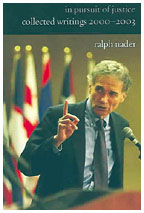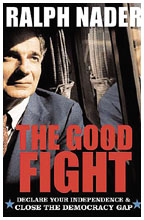February 9, 2005: Reading Room
Corporate profits are undertaxed, argues Ralph Nader ’55, and as a result, individuals pay higher taxes. (Impact Visuals/Clark Jones) |
Big
business and political power
Ralph Nader ’55 looks at how corporations have shaped
the economy, environment, and culture
As an undergraduate, Ralph Nader ’55 tried to ban spraying of the insecticide DDT at Princeton. Since then, he has become one of the country’s best-known activists, penned numerous books, and run for president twice. In two books published in 2004 before the election, In Pursuit of Justice: Collected Writings 2000—2003 (Seven Stories) and The Good Fight (ReganBooks), Nader explains how he believes that a continuing shift of political power away from individual citizens toward large corporations has affected the economy, the environment, American culture, and individuals’ rights. Nader spoke in mid-November with Leslie Brunetta ’82.
What are some of the major problems caused by what you see as corporate control of Washington?
Politicians have given corporations round after round of tax preferences, shelters, and haven opportunities. Because corporate profits are undertaxed, individuals pay higher taxes, our children will pay for higher budget deficits, and we receive fewer public services. Politicians have socialized traditional corporate investment risk by giving away taxpayer-financed pharmaceutical research done under the National Institutes of Health to drug companies and then eliminating market competition by giving these companies monopoly marketing agreements for the drugs. The company has low risk and high reward because consumers pay twice, once as taxpayers and again as patients.
 Corporations,
with their campaign money and lobbyists, have weakened the Environmental
Protection Agency, Food and Drug Administration, and other regulatory
agencies. Now the agencies that are supposed to protect the environment
or stem corporate fraud, for example, consult with the corporations and
mildly exhort them to do better. So our air and water are dirtier than
they should be, and worker pensions and investors have lost trillions
in corporate scandals while a few executives get slaps on the wrist.
Corporations,
with their campaign money and lobbyists, have weakened the Environmental
Protection Agency, Food and Drug Administration, and other regulatory
agencies. Now the agencies that are supposed to protect the environment
or stem corporate fraud, for example, consult with the corporations and
mildly exhort them to do better. So our air and water are dirtier than
they should be, and worker pensions and investors have lost trillions
in corporate scandals while a few executives get slaps on the wrist.
 What
legislative remedies would be effective in checking corporations’
political influence?
What
legislative remedies would be effective in checking corporations’
political influence?
You could pass laws that would make it easier for individual consumers, investors, taxpayers, and workers to band together so they could have more power. For instance, in 1983 Illinois enacted a law requiring monopoly utility companies to include an insert in their bills explaining how and why customers should join the state Citizens Utility Board. The board’s staff researches the utilities’ operations and then reports and testifies on how customers’ interests are or aren’t served. In 1993, the board negotiated a $1.3 billion refund from Commonwealth Edison [electric company] to its customers.
But how could such legislation be passed if, as you suggest, corporations control legislators?
The one giant lever to turn things around is to take control of Congress.
Congress is just 535 people. Get two or three million people as serious
about watching to make sure Congress acts in the public interest as some
people are about watching birds, and the situation would change dramatically.
![]()
BOOK SHORTS
 Golf Courses of the PGA Tour — George Peper ’72 (Harry
Abrams). The author describes golf courses of the PGA Tour in a coffee-table
book with large color photographs. He includes schematic maps of the courses,
yardage and par information for the holes, tips on how to play specific
shots, and historical tidbits about the courses. Peper was editor-in-chief
of Golf Magazine for 25 years.
Golf Courses of the PGA Tour — George Peper ’72 (Harry
Abrams). The author describes golf courses of the PGA Tour in a coffee-table
book with large color photographs. He includes schematic maps of the courses,
yardage and par information for the holes, tips on how to play specific
shots, and historical tidbits about the courses. Peper was editor-in-chief
of Golf Magazine for 25 years.
 Good Deeds, Good Design: Community Service Through Architecture —
edited by Bryan Bell ’83 (Princeton Architectural Press). A collection
of essays by architects and individuals working to help communities, this
book argues that good architecture should be made available to underserved
people and communities. The essayists describe their own efforts to design
houses for low-income families, a waterfront park in California, and other
projects. Bell is director of Design Corps, an architectural firm.
Good Deeds, Good Design: Community Service Through Architecture —
edited by Bryan Bell ’83 (Princeton Architectural Press). A collection
of essays by architects and individuals working to help communities, this
book argues that good architecture should be made available to underserved
people and communities. The essayists describe their own efforts to design
houses for low-income families, a waterfront park in California, and other
projects. Bell is director of Design Corps, an architectural firm.
 Ronald Reagan and His Quest to Abolish Nuclear Weapons —
Paul Lettow ’99 (Random House). A revisionist view of Reagan’s
presidency, this study maintains that the late president had long wished
to ban nuclear weapons — a hope that led Reagan to pursue the Strategic
Defense Initiative (SDI, otherwise known as “Star Wars”) and
influenced his administration’s Cold War approach. Lettow is a student
at Harvard Law School.
Ronald Reagan and His Quest to Abolish Nuclear Weapons —
Paul Lettow ’99 (Random House). A revisionist view of Reagan’s
presidency, this study maintains that the late president had long wished
to ban nuclear weapons — a hope that led Reagan to pursue the Strategic
Defense Initiative (SDI, otherwise known as “Star Wars”) and
influenced his administration’s Cold War approach. Lettow is a student
at Harvard Law School.
By K.F.G.
For a complete list of books received, click here.

